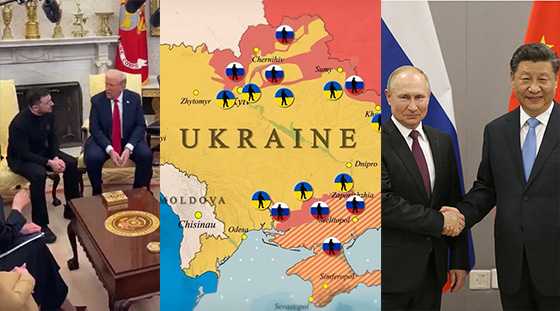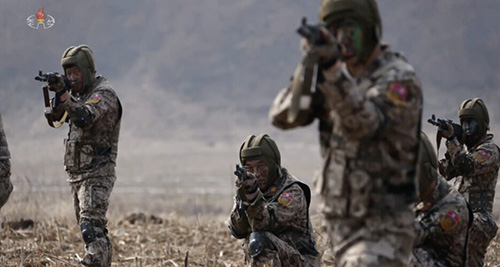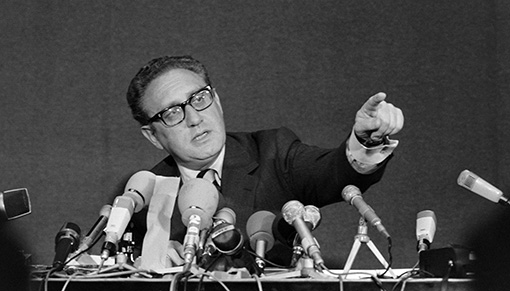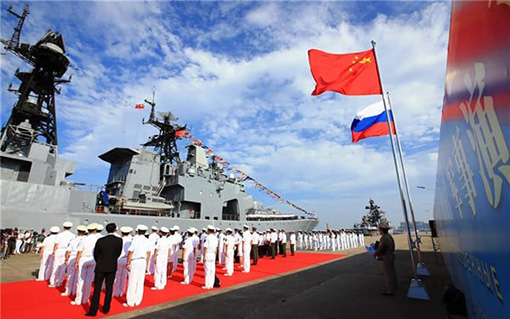|
| My enemies friend is my ......... |
Could Trumps hope for a quickie Ukraine deal pay off? And can a Russian Chinese military alliance be rolled back, or has that ship sailed long ago? |
 |
It may be dangerous to be America's enemy, but to be America's friend is fatal, Henry Kissinger once said. And today, Ukraine is finding that out the hard way. Trump's U-turn on Ukraine has raised eyebrows in Europe and even in America itself. Once a vocal supporter of sending military aid to Kiev, he now seems eager to broker a deal with Moscow, one that would leave Ukraine in the lurch behind closed doors.
Trump, who trapped by his own campaign promise to get the war over with quickly will give the Russians just about just about....... everything! Well almost. Ukrainian territory, sanctions relief, pulling U.S. troops from Eastern Europe and barring Ukraine from NATO membership. And after a series of bi-lateral negotiations, including a 90 minute phone call with Vladimir Putin the Russians have offered little in return. The best Trump got out of that call was not to hit energy infrastructure. Not bad going seeing as a power plant was about to fall into Putin’s hands on the battlefield, and he didn’t want it destroyed in the fighting. It wouldn’t surprise many if it was Putin who had read the art of the deal recently, and not trump himself. Is this a new form of strategic thinking we are witnessing or just reckless deal making? Well, to understand we will have to look at the bigger picture.
“The one thing you never want to happen is you never want Russia and China uniting. Well, I'm going to have to un-unite them, and I think I can do that, too”. That's Trumps own words from an interview from October 2024. The war in Ukraine has dragged on longer than many anticipated. It has taken a toll on US resources with ammunition running out at one point. It’s hard to know what’s worse, the fact that munitions ran out, or that the information was out there for all the world to see. One thing is certain, the most interested party wasn’t the Russians, but the Chinese. It’s no secret that Beijing calls the shots in North Korea, as it supplies the country with pretty much everything the country needs. And within weeks of that news, North Korean troops showed up on the battle field fighting alongside the Russians. Trump and his security advisors believe that Washington should focus on containing China rather than engaging in endless conflicts in Eastern Europe. |
 |
| North korean troops have been fighting in Ukraine since mid 2024 |
The logic behind it is simple if two of your enemies are close, pull one away. It worked in the 1970s when the U.S. courted China to isolate the Soviet Union. Now Trump looks to pull the same trick in reverse flip Russia to contain China in the decade to come. Seen in this light, Ukraine has now become a pawn being set up to be sacrificed. Of course, Russia and China know perfectly well what Trump is trying to do. In anticipation, Beijing is now on a charm offensive of its own. It wants to strengthen coordination with Russia. It is hosting nuclear talks and holding joint naval drills while promoting Russian goods at home. Meanwhile, as the taps for cheap Russian energy were switched off to Europe (or blown up in the case of nordstream2) more Russian oil was imported into China than ever before, and trade between the two hit a new record high.
Both American and Russian diplomats have revealed little about the negotiations. All we know with certainty is that the talks are taking place during the most dangerous phase of the Ukraine war. This requires some clarification. In November 2024, the Biden administration permitted Kiev to use long range missiles against targets inside internationally recognized Russian territory, including US made ATACMS US and UK made Storm shadow missiles.Ukraine has put these weapons to use hitting targets in Kursk and Crimea. These attacks have the Kremlin on edge, not because of the damage they inflict, but because of America's disregard for Moscow's nuclear deterrent, something which the Russians have communicated many times over. Putin for instance, has said that Ukrainian forces cannot use weapons like ATACMS and Storm shadow without technical assistance from NATO personnel.
From the Russian Perspective. When Ukraine uses these weapons, it's as if NATO's itself is attacking Russia. While ATACMS have been used against targets in Crimea, without much retaliation, hitting targets within Russia's mainland borders is a step up the escalation ladder. In response to what it sees as NATO aggression, the Kremlin updated its nuclear doctrine, one that allows for nuclear strikes on non-nuclear powers. And to prove it could do so, Russia fired a nuclear capable missile at a military base in western Ukraine, the damage was minor though the message was clear. The damage was relatively minor, so the missile probably had no payload and instead served as a demonstration of Russia's resolve. A week later, the Russians used a drone with a high explosive warhead to hit the former Chernobyl power plant in Ukraine, damaging its radiation shield.
There were no signs of radiation leaks. Nevertheless, these incidents show the growing nuclear risks and the necessity of negotiating a cease fire. This is why Trump is in a rush to settle some sort of deal with Putin, a deal where Ukraine would surrender territory resources and sovereignty to Russia. In return, Trump hopes Putin will ally with him against a much bigger, more powerful adversary in the Far East. As calculated as it may seem. Trump's divide and conquer policy toward Russia and China stems from a flawed misreading of the past and a misunderstanding of the present. Kissinger's trilateral policy succeeded for two reasons. Firstly, by the time of his secret trip to China in 1971, Moscow and Beijing had already been bitter enemies for years, and China sought to improve relations with America as a counterweight to Soviet power.
Secondly, at the time, Moscow wanted to patch up ties with Washington to reduce the pressure of both the arms race with America and its standoff with China. Fast forward to today and the dynamics have changed. Neither of those past conditions exists now. Sure, Russia and China aren't ideological soul mates, but they are strategic partners. They share a mutual disdain for American hegemony and have found a way to work together based on shared interests. And that's good enough for added context. China steadily became Russia's largest economic partner following the annexation of Crimea in 2014 and the Western sanctions that followed the Ukraine war then cemented this relationship. As the United States and the European Union applied even tougher sanctions, Russia came to rely almost entirely on China. Trade between the two soared. In the last two years. |
 |
| Henry Kissenger, former u.s. secretary of state |
For instance, Russia got about 40% of its imports from China and sent over 30% of its exports there. Military cooperation has also ramped up with joint exercises and intelligence sharing mechanisms now firmly in place. The two complement one another's strategic shortcomings. Russia is an abundant source of natural resources and has provided China with cheap energy and technology transfers. Meanwhile, China is an industrial powerhouse and has offered enough economic backing to keep Russia afloat in its war against Ukraine. By combining their assets, Moscow and Beijing could well dominate Eurasia, which is precisely what America fears the most. Admittedly, Russia doesn't like playing second fiddle to Beijing, but it recognizes the economic lifeline that China provides, especially since it has been cut off from many global financial markets.
What's more, as Beijing's power and influence continue to grow, Russia sees this as an opportunity to leverage its alliance to maintain geopolitical influence in a multiple world. So Russia’s pivot toward China is not just a reaction to U.S. policy. It's part of a broader realignment in the global order. Today, the partnership with China has become a strategic imperative for Russia, and its modern day leaders see no alternative to it. Trump's objective to flip Russia isn't just theory. It's been floated before, during his first tenure. Henry Kissinger reportedly encouraged Trump to improve relations with Moscow to counterbalance China's rise. But here's where reality sets in. The Ukraine war has made any American Russian reset nearly impossible. The West has levied heavy sanctions on Moscow and the Europeans see Russia as an existential danger.
So if Trump wants to split Russia and China, he has to make Putin an offer that outweighs what she provides. And right now, that’s a tall order. Beijing offers economic support, diplomatic backing and a growing tech sector that Russia desperate need. This is not to say that the United States has nothing to offer, though. On the contrary, Trump's team is reportedly negotiating to withdrawal of American troops from NATO countries that joined after 1990, including Poland, Romania, the Baltic’s and others.From the Russian point of view, NATO's eastward expansion at its doorstep is a threat to its survival, and the Kremlin would like nothing more than the exit of American troops. As of 2022, the United States has over 100,000 troops in Europe, with 10,500 troops stationed in Poland, 4000 in Lithuania, 1700 in Latvia, 2200 in Estonia, 2100 in Slovakia, 800 in Hungary, 300 in Romania and 900 in Bulgaria.
If Trump presses on with the withdrawal of U.S. troops, it should be taken as an attempt to court Russia with the goal of containing China. However, relations between Washington and Moscow are at their lowest. Rolling back NATO's eastern flank may not be enough. This that explains the recent shutdown of U.S. aid. You see, since the end of the Cold War, promoting democracy through U.S. aid has been a staple of American foreign policy. Institutions and organizations backed by U.S. aid have frequently and publicly criticized Russia and China for their lack of democracy. But the two have always resented this rhetoric as a violation of their sovereignty. So by closing U.S. aid, Trump is looking to make another concession to Russia. No more democracy promotion from now on, which means reducing U.S. soft power in certain parts of the world. |
 |
| joint Russian Chinese naval drills in the baltic sea |
These two major concessions degrading NATO's eastern flank and the shutdown of U.S. aid are in addition to Trump's sacrifice of Ukrainian territory, resources and sovereignty. So what Trump is essentially negotiating is to redesign the global order. He's making room for the Russians so that they joined the Americans to box in China. This framework is critical to understand. Otherwise, none of what Trump does will ever make sense.
Even so, it's questionable whether the Russians will take the bait. Unlike the Cold War era, when ideological rifts created political divisions, today’s world is shaped by economic interdependence. Sure, Russia will gladly accept concessions from the United States, but there is little reason to believe that the Russians would reciprocate in a meaningful way, let alone do a 180 degree turn and suddenly become hostile towards Beijing. China has proven itself to be an irreplaceable ally. Another point to consider and perhaps the most important is that even with Trump's back to back concessions, Putin knows that this will be Trump's final term. By contrast, Putin plans to stay in power well beyond 2029. But by then, a new US president could take over and cancel the deal with him for the Kremlin.
This makes any agreement with Trump feeble at best. Meanwhile, relations with China are stable, predictable, and too valuable to replace. Framed this way. Trump's peace deal with Russia seems short-sighted and unlikely to work as he hopes. In fact, Trump is more likely to hurt American interests in the process. Concessions to Russia would come at the cost of alienating NATO's allies, many of whom see Russia as a long term threat.If the talks with Putin fail, Trump will have lost more than he started with, his rhetoric will damage American soft power across the board and leave Ukrainians and NATO allies feeling betrayed. The tool for this gamble will be severe, so much so that the next president will have difficulty repairing those burnt bridges. And, in geopolitics as in life, the worst sin is to destroy and betray yourself for nothing. |
| |
|
|
|
|
|
|

